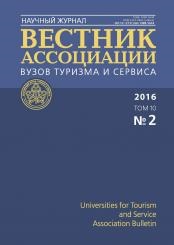The article is devoted to the issues of the development of tourist systems, which are a complex integrated natural-social entities. Development is one of the tourist system transformation options, which rests of needs-driven human activity. Needs satisfaction is largely dependent on the goal formation and goal realization. The current needs of a potential tourist are materialized in an individual tourist product, which is regarded, from the economy perspective, as classic and modern. From the modern perspective, a tourist product is an externalization of experience (most of all, impressions) coming from visitors, producers, sellers, and managers alike. Thus, modern tourist economy is primarily based on tourist experience (a visitor’s/guest’s impression and provider creativity) rather than on the classical advantages of territories/products (richness in resources, abundance of resources and product/service versatility, etc). Simultaneously, tourist product creation is increasingly co-produced. The development of tourist systems should be founded on sustainable development and reflexive symmetry. However, a tourist system development can sometimes have negative consequences closely related to geographical variation, personal viewpoint difference, and unfairness conceived.
development, system, tourism, tourism experience
Введение. Туристская система представляет собой целостный в пространстве и во времени выделенный из окружающей среды и взаимодействующий с ней динамичный объект, эмерджентные свойства которого обеспечиваются достаточными организованными связями и отношениями элементов (формирующих реализующие структуры и технологии), воздействием факторов и условий (внешних и внутренних), а функционирование направлено на решение определенных туристских целей. Территориальная туристская система – разновидность туристской системы, функционирование которой обусловлено пространственными связями и отношениями составляющих.
Туристская система может находиться либо в состоянии относительного покоя, либо преобразовываться через следующие варианты изменений (за счет внутренних и внешних сил): 1) количества, 2) качества, 3) отношений (изменение связей и отношений между элементами и компонентами), 4) количества и качества, 5) количества и отноше ний, 6) качества и отношений, 7) количества, качества, отноше ний всех или части его «первичных» элементов» [5]. Одной из форм преобразования систем является развитие – необратимое, направленное изменение системы в качественно новое состояние. Развитие может происходить как эволюционным (постепенные поступательные преобразования между стадиями), так
1. Aleksandrova A.Yu. Geografiya turizma kak nauchnaya distsiplina. Geografiya turizma / pod red. A.Yu. Aleksandrovoy. M.: KNORUS, 2013. 592 s.
2. Kaverin S.B. Motivatsiya truda. - M: Izd-vo «Institut psikhologii RAN», 1998. 224 s.
3. Sarancha M.A. Potentsial i organizatsiya razvitiya turizma v Udmurtskoy Respublike: geograficheskiy analiz i otsenka na osnove geograficheskikh informatsionnykh sistem: monografiya. Izhevsk: Izd-vo «Udmurtskiy universitet», 2011. 220 s.
4. Stepin V.S., Gorokhov V.G., Rozov M.A. Filosofiya nauki i tekhniki. M.: Kontakt-Al´fa, 1996. 380 s.
5. Urmantsev Yu.A. Tselostnye, netselostnye, tselostno-netselostnye, «nebytiynye» svoystva ob´´ektovsistem. Sbornik 5 Mezhdunarodnogo foruma po informatizatsii. M., 1996.
6. Butler R.W. The concept of a tourist area cycle of evolution: implications for management of resources. Canadian Geographer, 1980. V. 24. №1.
7. Cooper C., Hall C.M. Contemporary tourism. An international approach. Burlington: Elsevir, 2008. P. 14.
8. Pearce P.L. Tourist Behaviour: themes and conceptual schemes. - Clevedon, UK: Channel View Publications, 2005. 241 pp.
9. Plog S.C.Leisure Travel: Making It a Growth Market... Again! N.Y.: Wiley, 1991.
10. Weaver D. Sustainable tourism theory and practice. - Amsterdam: Butterworth-Heinemann, 2008. 240 p.





